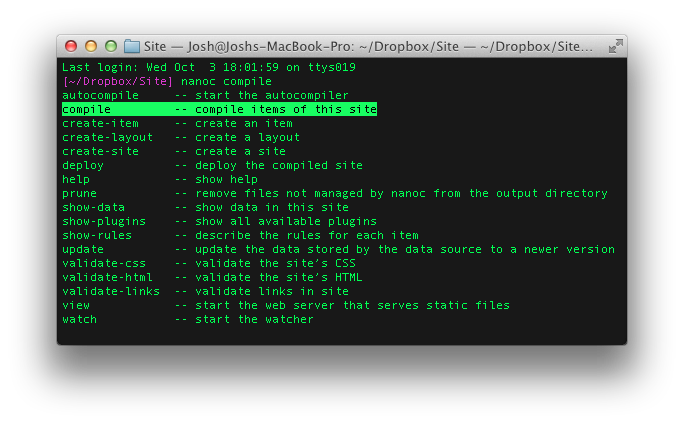Static blogging engines are the only way to go, not just for the reduction of server resources, but also for the unlimited ability for customization (and not being beholden to a behemoth like WordPress). This blog - and indeed this whole site, is built with the totally awesome Nanoc static site generator. Setting up and using Nanoc’s tools is already super easy, but I wanted to make them even easier and more enjoyable to use - so I’ve created a simple ZSH plugin that includes autocompletion and aliases for common tasks.
Autocompletion is invoked like all ZSH completions, type “nanoc “ and then hit Tab - you then use Tab to cycle through available functions and Return to make a selection.

On top of the autocompletion, aliases provide even easier access to common tasks. At the time of writing they include:
n = “nanoc”na = “nanoc autocompile”nco = “nanoc compile”nci = “nanoc create_item”ncl = “nanoc create_layout”ncs = “nanoc create_site”nd = “nanoc deploy”nv = “nanoc view”nw = “nanoc watch”
So, for example - to autocompile a site, you need only type “na”.
I use the Oh-My-Zsh framework for managing my shell configuration, so I’ve forked that and added the plugin to my fork.
Unfortunately, after a month my pull request still hasn’t been accepted - the project currently has 432 open pull requests so this is hardly surprising. If you’re already running Oh-My-Zsh, the best way to download the plugin is to fetch it from my fork and merge it into your current configuration:
git remote add josh git://github.com/josh-/oh-my-zsh.git
git fetch josh
git merge josh/master
These commands will download the changes in my fork and merge them into your custom Oh-My-Zsh directory, keeping all changes you’ve made intact. Then just add nanoc to your .zshrc plugins.
I hope to continue improving this plugin - if you have any suggestions, comments or questions, please feel free to contact me.
Update: The plugin has been merged into the master branch of Oh-My-Zsh, so all you have to do now is update your Oh-My-Zsh config with:
cd ~/.oh-my-zsh
git pull origin master